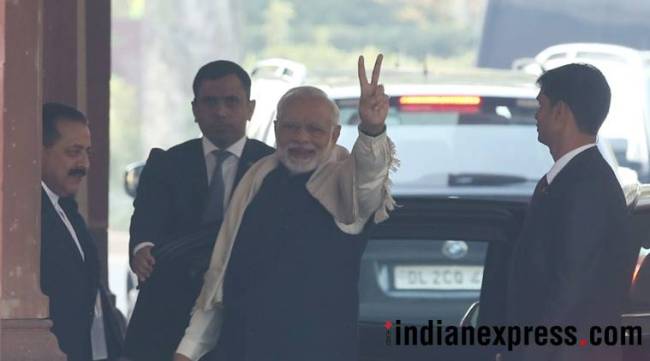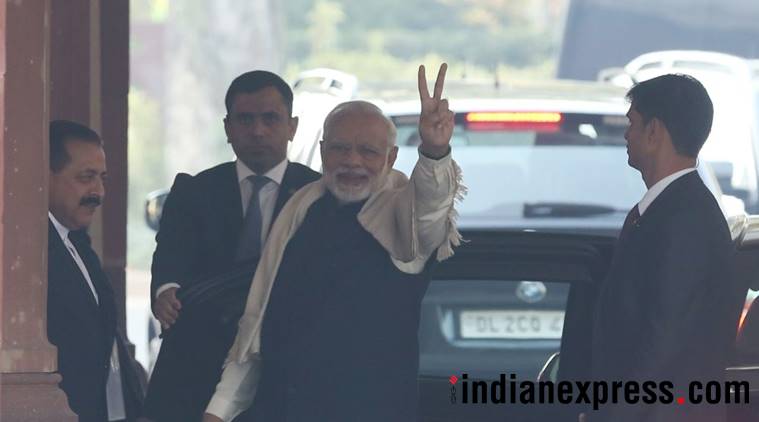Opinion BJP’s developmental politics won over politics of caste played by Rahul, Hardik & friends
There are many politicians who came from poor economic background. They may or may not have sold chai. But there is no one like Modi who has jettisoned everything in the pursuit of the developmental politics and nation building.
 Narendra Modi. (Express Photo/Renuka Puri)
Narendra Modi. (Express Photo/Renuka Puri)  Prime Minister Narendra Modi symbolises this positive governance and is the principal architect of the Gujarat development story. (Express Photo/Renuka Puri)
Prime Minister Narendra Modi symbolises this positive governance and is the principal architect of the Gujarat development story. (Express Photo/Renuka Puri)
The BJP’s sixth victory in a row in Gujarat is historic, as this is only the second time in India’s electoral history (the Left parties, which won West Bengal for 34 years, was the first) that this has happened. The BJP credits this victory as a win for developmental politics and the credibility of its leadership.
Over the past three years in Gujarat, there was a clear attempt to create a caste conundrum and fuel caste flames. As the Congress party had found it difficult to fight the BJP on the twin issues of development and governance over the past two decades, it has employed old regressive strategy of 1980s and the 1990s, a time when it had successfully won elections purely by forging caste coalitions and disregarding the developmental challenges of Gujarat.
The manner in which caste agitations were led by various groups, like Alpesh Thakore, Jignesh Mevani and even Hardik Patel, showed that the various agitations in Gujarat over the last three years, including the Patidar agitation, have had the tacit backing of the Congress party. This became even more clear when in the run up to the election, these people joined forces with the Congress.
We see the Gujarat victory as a victory for democracy, as people belonging to all caste groups refusing to get swayed by the caste politics of the Congress party, and at the same time blessing the BJP to continue its developmental politics.
The success story of Gujarat’s development is evident from the double digit economic growth that the state has achieved year after year under BJP rule, as well as massive prosperity and growth in the agricultural sector.
It would be disingenuous and dishonest for anyone to project the Gujarat win as a victory for anything other than development. Indian democracy has matured over the years, as people have rewarded performance over all other issues and punished inability to deliver good governance.
At a time when most state governments get voted out after one election, a sixth consecutive win can only be possible because of good governance, and not by any emotive factors.
Over 22 years that the BJP has been in power in Gujarat, the state has achieved a six-fold increase in agricultural output and a ten-fold increase in per capita income. It has achieved massive strides in elementary education by achieving near hundred per cent enrollment – one per cent of children are dropouts.
These are remarkable achievements that no state has matched in the last two decades and that is the real story of the BJP’s consecutive wins in Gujarat.
Prime Minister Narendra Modi symbolises this positive governance and is the principal architect of the Gujarat development story. Undoubtedly, the success of this election goes to the PM. The politics of governance that he espouses and has successfully delivered in the state is what makes him a unique leader.
It is not ‘asmita’ or some amorphous Gujarati pride that has swept the voters of Gujarat, but the politics of the Prime Minister and his governance model both in the state and in the Centre.
The PM epitomises the high standards of governance and incorruptibility. What makes him so adorable and admirable is that he has devoted his entire life to the pursuit of development and governance, while distancing himself from his family. There are few people in politics both in India and abroad who have detached family from politics. In contrast, the Congress party has only perpetuated family rule in politics.
There are many people in politics from a poor economic background. They may or may not have sold chai. But there is no one like Mr Modi who has jettisoned everything, like a real Yogi, in the pursuit of the politics of development.
The Prime Minister emerges from this election as a ‘real hero’ who pulls off a victory for the BJP in a fierce contest where caste flare-up was used as an electoral tool by the Congress.
The BJP had set itself an ambitious target of 150 seats (out of a 182-seat Assembly). Party president Amit Shah publicly set this target so that it pushed us all to work hard. But the politics of caste that flared up made it a difficult election for the BJP.
Rahul Gandhi and the Congress party completely failed in Gujarat because the first rule of politics is credibility and consistency, which is the hallmark of a good leader. But Rahul Gandhi lacks both. Politics is not an acting career, in which you can play one act in Gujarat and one another act in UP.
Not only has Gandhi lost Gujarat, he has also diminished himself in the eyes of the secular brigade, which has openly seen how he has pursued the politics of opportunism.
(As told to Jyoti Malhotra)






